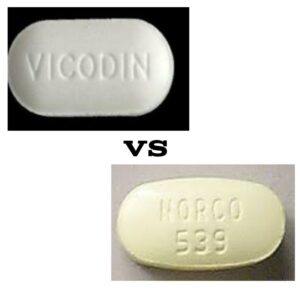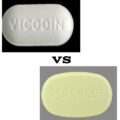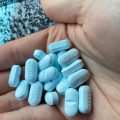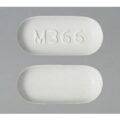What is Vicodin?
Vicodin is a strong prescription pain medicine that contains an opioid (narcotic) that is used to manage pain severe enough to require an opioid pain medicine when other pain treatments such as non-opioid pain medicines do not treat your pain well enough or you cannot tolerate them. An opioid pain medicine that can put you at risk for overdose and death. Even if you take your dose correctly as prescribed you are at risk for opioid addiction, abuse, and misuse which can lead to death.
Are Vicodin and Norco the same thing?
Norco is a combination medication is used to relieve moderate to severe pain. It contains an opioid pain reliever (hydrocodone) and a non-opioid pain reliever (acetaminophen). Hydrocodone works in the brain to change how your body feels and responds to pain. Acetaminophen can also reduce a fever. Both Norco (hydrocodone bitartrate and acetaminophen) and Vicodin (hydrocodone/acetaminophen) are combinations of an opioid analgesic and antitussive (cough suppressant) and a pain reliever (analgesic) used to treat moderate to fairly severe pain.
What are the possible side effects of Vicodin?
Common side effects of Vicodin include:
- lightheadedness,
- dizziness,
- anxiety,
- nausea,
- vomiting,
- upset stomach,
- drowsiness,
- constipation,
- headache,
- mood changes,
- blurred vision,
- ringing in your ears,
- dry mouth, and
- difficulty urinating.
What are the possible side effects of Norco?
Norco is available in generic form. Side effects of Norco include:
- anxiety,
- dizziness,
- drowsiness,
- lightheadedness,
- nausea,
- vomiting,
- upset stomach,
- constipation,
- headache,
- mood changes,
- blurred vision,
- ringing in your ears, or
What drugs interact with Norco?
Norco, like all narcotics, may impair the mental and/or physical abilities required for the performance of potentially hazardous tasks such as driving a car or operating machinery; patients should be cautioned accordingly. Alcohol and other CNS depressants may produce an additive CNS depression, when taken with this combination product, and should be avoided.
Hydrocodone may be habit-forming. Patients should take the drug only for as long as it is prescribed, in the amounts prescribed, and no more frequently than prescribed.
What drugs interact with Vicodin?
While taking Vicodin DO NOT:
Drive or operate heavy machinery, until you know how Vicodin affects you. Vicodin can make you sleepy, dizzy, or lightheaded. Drink alcohol or use prescription or over-the-counter medicines that contain alcohol. Using products containing alcohol during treatment with Vicodin may cause you to overdose and die.
How should Vicodin be taken?
Do not change your dose. Take Vicodin exactly as prescribed by your healthcare provider. Use the lowest dose possible for the shortest time needed.
Take your prescribed dose every four to six hours as needed for pain.
Do not take more than your prescribed dose. If you miss a dose, take your next dose at your usual time.
Call your healthcare provider if the dose you are taking does not control your pain.
If you have been taking Vicodin regularly, do not stop taking Vicodin without talking to your healthcare provider.
After you stop taking Vicodin, the unused tablets should be disposed of by flushing them down the toilet.
How should Norco be taken?
The dosage should be adjusted according to the severity of the pain and the response of the patient. However, it should be kept in mind that tolerance to hydrocodone can develop with continued use and that the incidence of untoward effects is dose related. The usual adult dosage is one or two tablets every four to six hours as needed for pain. The total daily dosage should not exceed 8 tablets.
Frequently Asked Questions On Hydrocodone/Acetaminophen combinations
What happens if I miss a dose?
Since this medicine is used for pain, you are not likely to miss a dose. Skip any missed dose if it is almost time for your next dose. Do not use two doses at one time.
What happens if I overdose?
Seek emergency medical attention or call the Poison Help line at 1-800-222-1222. An overdose of acetaminophen and hydrocodone can be fatal. The first signs of an acetaminophen overdose include loss of appetite, nausea, vomiting, stomach pain, sweating, and confusion or weakness. Later symptoms may include pain in your upper stomach, dark urine, and yellowing of your skin or the whites of your eyes. Overdose can also cause severe muscle weakness, pinpoint pupils, very slow breathing, extreme drowsiness, or coma. SEE: How to Spot Fake, Counterfeit Watson 853 White Pill [Norco]
What should I avoid while taking acetaminophen and hydrocodone?
Avoid driving or operating machinery until you know how this medicine will affect you. Dizziness or drowsiness can cause falls, accidents, or severe injuries. Do not drink alcohol. Dangerous side effects or death could occur. Ask a doctor or pharmacist before using any other medicine that may contain acetaminophen (sometimes abbreviated as APAP). Taking certain medications together can lead to a fatal overdose.
What are the possible side effects of acetaminophen and hydrocodone?
Get emergency medical help if you have signs of an allergic reaction: hives; difficulty breathing; swelling of your face, lips, tongue, or throat. Opioid medicine can slow or stop your breathing, and death may occur. A person caring for you should seek emergency medical attention if you have slow breathing with long pauses, blue colored lips, or if you are hard to wake up.
In rare cases, acetaminophen may cause a severe skin reaction that can be fatal. This could occur even if you have taken acetaminophen in the past and had no reaction. Stop taking this medicine and call your doctor right away if you have skin redness or a rash that spreads and causes blistering and peeling.
Call your doctor at once if you have:
- noisy breathing, sighing, shallow breathing;
- a light-headed feeling, like you, might pass out;
- liver problems –nausea, upper stomach pain, tiredness, loss of appetite, dark urine, clay-colored stools, jaundice (yellowing of the skin or eyes); or
- low cortisol levels — nausea, vomiting, loss of appetite, dizziness, worsening tiredness or weakness.
Seek medical attention right away if you have symptoms of serotonin syndrome, such as agitation, hallucinations, fever, sweating, shivering, fast heart rate, muscle stiffness, twitching, loss of coordination, nausea, vomiting, or diarrhea.
Serious side effects may be more likely in older adults and those who are overweight, malnourished, or debilitated.
Long-term use of opioid medication may affect fertility (ability to have children) in men or women. It is not known whether opioid effects on fertility are permanent.
Common side effects include:
- dizziness, drowsiness, feeling tired;
- nausea, vomiting, stomach pain;
- constipation; or
- headache.
This is not a complete list of side effects and others may occur. Call your doctor for medical advice about side effects. You may report side effects to FDA at 1-800-FDA-1088. SEE: Vicodin vs Percocet: Differences, Similarities, Side Effects
What other drugs will affect acetaminophen and hydrocodone?
You may have breathing problems or withdrawal symptoms if you start or stop taking certain other medicines. Tell your doctor if you also use an antibiotic, antifungal medication, heart or blood pressure medication, seizure medication, or medicine to treat HIV or hepatitis C.
Opioid medication can interact with many other drugs and cause dangerous side effects or death. Be sure your doctor knows if you also use:
- cold or allergy medicines, bronchodilator asthma/COPD medication, or a diuretic (“water pill”);
- medicines for motion sickness, irritable bowel syndrome, or overactive bladder;
- other narcotic medications –opioid pain medicine or prescription cough medicine;
- a sedative like Valium –diazepam, alprazolam, lorazepam, Xanax, Klonopin, Versed, and others;
- drugs that make you sleepy or slow your breathing –a sleeping pill, muscle relaxer, medicine to treat mood disorders or mental illness;
- drugs that affect serotonin levels in your body –a stimulant, or medicine for depression, Parkinson’s disease, migraine headaches, serious infections, or nausea and vomiting.
This list is not complete. Other drugs may affect acetaminophen and hydrocodone, including prescription and over-the-counter medicines, vitamins, and herbal products. Not all possible interactions are listed here.
Where can I get more information?
Your doctor or pharmacist can provide more information about acetaminophen and hydrocodone. SEE: How to Spot Fake RP 7.5/325, 5/325 (Percocet, Norco, Endocet, Lortab)




![How To Spot A Yellow Pill V 3601 Fake [Norco]](https://www.publichealth.com.ng/wp-content/uploads/2018/08/IMG_20180801_125547_037-120x120.jpg)

